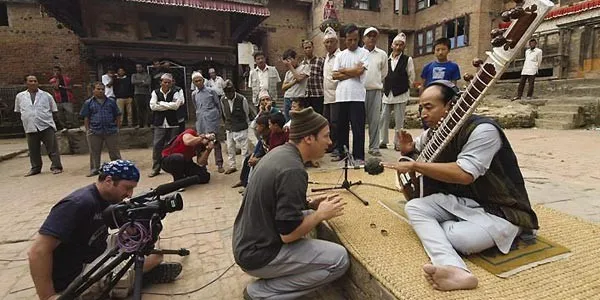Playing For Change to transform and unite the world through music
Music has a huge influence on how we view the world, but how can a song actually change it? The legendary Bono of U2 once said, “Music can change the world because it can change people.”
Songs create a strong bond between individuals, make masses speak the same language and seek a common goal while delivering a message.

If this introduction sounds clichéd it is because there is no other way to define how a simple action can have immense impact. In a New York subway, sound engineer Mark Johnson was distracted by two young monks wearing long white vests singing and playing the guitar. They had attracted an appreciative crowd of 200 people around them and Mark found himself among them.
“I got on the train and headed to work and I thought to myself the greatest music I had ever heard was on the way to the studio and not in the studio. I realized great music and art are just moments in time and they exist everywhere. We can use the energy from these moments to connect people”.
This had a powerful influence on Mark and he had an idea of creating a global music project to give street artists an opportunity to be seen, heard and spread the message of unity. Thus was born Playing For Change (PFC) project.

“As a human race we come together for birth, and we come together for death. What bring us together in between is up to us. Stop and listen to the universal language of music, and bring that positive energy with you everywhere you go,” says Mark on Playing for Change’s website.
Ten years after that meeting on the subway, Playing For Change (PFC) project was born as a mobile recording studio with high-tech equipment to record the works of many street musicians around the world, creating different interpretations of famous songs, and respecting the culture and language of each artist, whether they are Black, White, Latinos, Arabs, European or belonging to indigenous communities. The main concept behind the project is that music is a common uniting factor.

The PFC band is working on creating its third album. Besides, the disks, PFC has also released the award-winning documentary “A cinematic discovery of street musicians”, showing the places where Johnson’s idea has already arrived. What started as an old cliché ‘a camera in hand and an idea in your head,’ is now configured in the Playing for Change Foundation, a non-governmental organization (NGO) that aims to connect the world through music by providing location, instrument and educational programs for poor children in different parts of the globe, in addition to supporting the communities they live in.
There are nine music schools around the world, with 700 students and 153 projects being executed or under implementation. Playing For Change deals with the recording, the PFC Band, and merchandise and has worked with Tibetan refugees. In addition, a percentage of the CD and DVD proceeds go toward the foundation’s programs. In India, the PFC crew had a chance to meet Rajesh Vaidhva, master of veena – a large stringed instrument of the sitar family – in Chennai. The meeting resulted in the Rhaguvamsa Sudha episode, available online on the PFC website.
To get a feel of this amazing project, you can check their version of the classic, ‘Stand by Me’ from Ben E. King. Musicians from the US, France, Mexico, South Africa, Netherlands, Brazil, Russia and more recorded from their home towns and what resulted is the best expression of how music has no borders and a common aggregation factor for all nations and people:
[youtube http://www.youtube.com/watch?v=Us-TVg40ExM?rel=0]
Recently, the pop/rock band Maroon 5 showed their support to Playing For Change through the song ‘Daylight’, with a mix of different singers’ recordings. Bono Vox and Manu Chao, a French artist who sings in French, Spanish, English and Portuguese and is also an activist, have also expressed their support for Playing For Change.
The best way to support PFC Foundation is to donate directly through their website: www.playingforchange.org.







